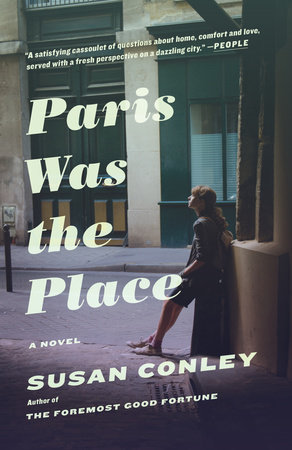Reading Group Center
- Home •
- Books by Category •
- Imprints •
- News •
- Videos •
- Media Center •
- Reading Group Center
Paris Was the Place
By Susan Conley
1. The epigraph, from Gertrude Stein, includes the title phrase: “And so when hats in Paris are lovely and french and everywhere/then France is alright. So Paris was the place that suited us...” What does it mean? Why do you think Conley chose it?
2. What is Willie looking for in Paris? Does she find it?
3. Each chapter title is the definition of a word or phrase. How does Conley use this device to direct the reader’s attention?
4. On page 28, Willie teaches the girls about Sarjoni and the notion of the “high dream,” the things that matter most. What is Willie’s high dream?
5. Why was Willie’s relationship with her father so strained? What are her feelings about her unconventional mother? How do these affect her relationships with Macon and Luke?
6. "Mothering often feels like the first cousin of teaching,” Willie says on page 52. How does this play out in the novel? In what places does Willie lose sight of the distinction between the two?
7. Why does Willie feel such an affinity for Gita? Why does she decide to help her? Is the risk Willie takes in doing so worth it?
8. In some ways, the character Macon seems too good to be true, but there is more to him than meets the eye. In what ways is Macon not facing the truth about his personal life? Is he a good father? Would he make a good husband for Willie? How realistic is he about the fate of the girls in his trust? How does his own family’s history as refugees inform his work?
9. On page 154, Willie teaches her American students a poem by Rainer Maria Rilke, which ends with the phrase, “You must change your life.” Willie finds this especially powerful—why?
10. The power of poetry is a theme in the novel—on page 172 a poet tells Willie, “‘I wouldn’t be a poet unless I had some hope.’” What point is Conley trying to make?
11. Several characters in the novel—Gaird and Willie’s parents—leave and then choose to return. Contrast this with the girls at the asylum center, many of whom are forced to return to their home countries. How do the situations relate?
12. When Willie and Macon go to India, what do we learn from the incident on the bus? (p. 283) How does that trip change Willie?
13. On page 313, Macon says to Willie about his son, “Family is a very malleable thing for a five-year-old. I think it’s really about who he trusts. Who is safe. Who he can tell really loves him.” How is this similar to Willie’s idea of family?
14. When Luke is dying, Willie believes that she doesn’t have a childhood without him—that her childhood becomes a lie with his death. (p.337) What does she mean by that? Is she right?
15. Conley sets the novel in 1989, a time when the world was only just becoming aware of the devastation of AIDS. How does the uncertainty surrounding the disease affect the way that Luke’s loved ones (Willie, his father, Gaird) cope with his illness? What about Luke himself?
16. The last paragraphs of the novel focus on the ideas of hope and courage. Are they the twin themes of the entire story?


